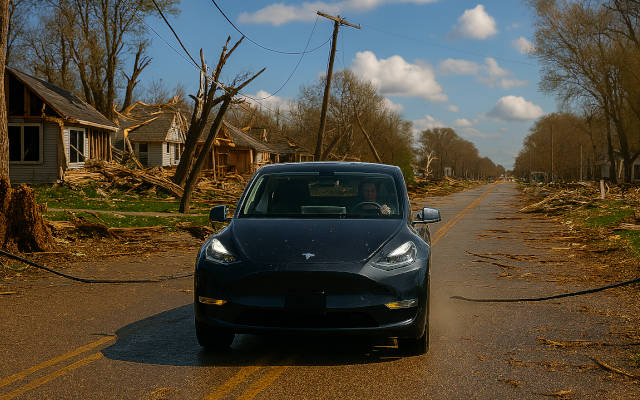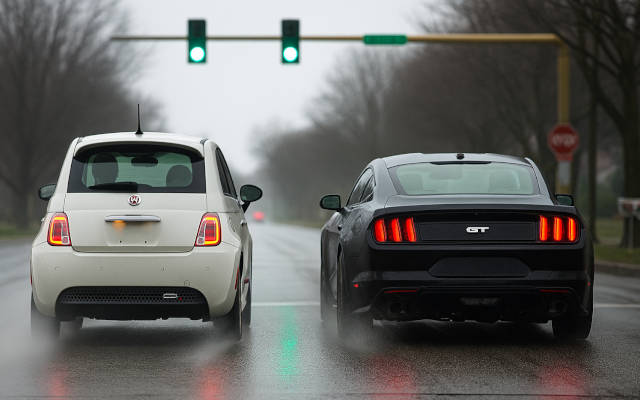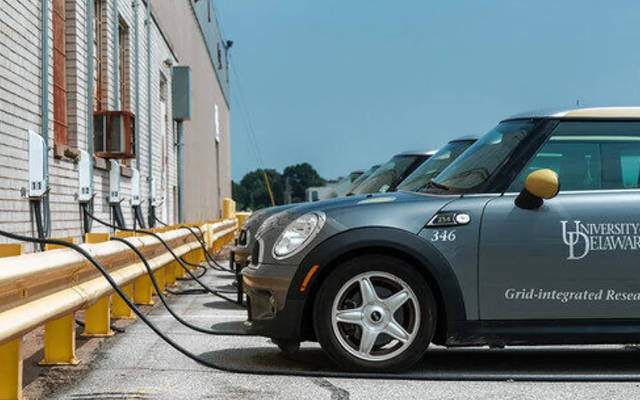 EDITOR'S PICK
EDITOR'S PICK
A Power Outage Means You Can't Charge Your EV: What Do You Do?
20 Oct 2025 | Synopsis
 If your power goes out, your home EV charging stops - but so do gasoline pumps, so you’re not at a unique disadvantage. Most outages are short: the average US user experienced under six hours of interruption in 2023. To prepare, keep your EV topped up (rather than waiting until very low), know public DC and Level-2 charging stations within about 25–50 miles, and if you have a generator, wiring for at least a trickle charge helps.
If your power goes out, your home EV charging stops - but so do gasoline pumps, so you’re not at a unique disadvantage. Most outages are short: the average US user experienced under six hours of interruption in 2023. To prepare, keep your EV topped up (rather than waiting until very low), know public DC and Level-2 charging stations within about 25–50 miles, and if you have a generator, wiring for at least a trickle charge helps.
Stop Babying Your EV: Hard Acceleration Actually Extends Battery Life by 195K Miles
20 Oct 2025 | Synopsis
 A study by Geotab found that electric vehicles (EVs) driven with frequent hard acceleration had battery lifespans extended by up to 195,000 miles. Contrary to common belief, gentle driving may not always benefit EV batteries. The research suggests that consistent, vigorous use helps maintain battery health by keeping cells active and balanced, challenging assumptions about EV driving habits.
A study by Geotab found that electric vehicles (EVs) driven with frequent hard acceleration had battery lifespans extended by up to 195,000 miles. Contrary to common belief, gentle driving may not always benefit EV batteries. The research suggests that consistent, vigorous use helps maintain battery health by keeping cells active and balanced, challenging assumptions about EV driving habits.Bridging The Red-Blue Divide On Climate
18 Oct 2025 | Synopsis
 The commentary by Ken Silverstein argues that bridging the red-blue divide on climate requires listening, finding shared values, and focusing on practical solutions rather than ideology. He highlights how conservative voices like Heather Reams align clean energy with economic growth, innovation and energy independence.
Polls show strong public support for renewables across political lines.
The commentary by Ken Silverstein argues that bridging the red-blue divide on climate requires listening, finding shared values, and focusing on practical solutions rather than ideology. He highlights how conservative voices like Heather Reams align clean energy with economic growth, innovation and energy independence.
Polls show strong public support for renewables across political lines.
E-quipment highlight: Tilmor Super E electric cultivating tractor
18 Oct 2025 | Synopsis
 The Tilmor Super E is a purpose-built electric cultivating tractor made in the USA. It offers quiet, zero-emission operation and a clear view of the work being done. The tractor features a 48V electric system with an expandable battery platform for up to eight hours of runtime. Designed for precision weeding and cultivating, the Super E aims to provide a better farming experience with reduced maintenance and operational costs.
The Tilmor Super E is a purpose-built electric cultivating tractor made in the USA. It offers quiet, zero-emission operation and a clear view of the work being done. The tractor features a 48V electric system with an expandable battery platform for up to eight hours of runtime. Designed for precision weeding and cultivating, the Super E aims to provide a better farming experience with reduced maintenance and operational costs.Letting EVs Take A Load Off The Grid Could Result In 'Negative Emissions' While Saving Drivers Money
17 Oct 2025 | Synopsis
 A Lawrence Berkeley National Lab study finds EVs can reduce grid strain and emissions by charging during low-demand periods and discharging during peak times. This vehicle-to-grid (V2G) strategy could lead to net-negative emissions and save drivers money. Researchers highlight EVs' potential as mobile energy storage, supporting renewables and cutting fossil fuel reliance - all while benefiting both the grid and consumers.
A Lawrence Berkeley National Lab study finds EVs can reduce grid strain and emissions by charging during low-demand periods and discharging during peak times. This vehicle-to-grid (V2G) strategy could lead to net-negative emissions and save drivers money. Researchers highlight EVs' potential as mobile energy storage, supporting renewables and cutting fossil fuel reliance - all while benefiting both the grid and consumers.
 EVWorld Exclusive
EVWorld Exclusive
Charging in Motion: Europe's Electric Roads Are Quietly Rewiring Freight Logistics
28 Oct 2025 |  France's A10 motorway now features a live inductive charging lane, letting EV trucks gain 1.5–3 km of range while driving. Similar pilots in Germany and Italy use embedded coils, while Sweden's eRoadArlanda powers trucks via overhead or in-road conductive systems. These dynamic charging projects aim to reduce battery size, cut downtime, and enable continuous freight operation - signaling a shift toward electrified logistics corridors across Europe.
France's A10 motorway now features a live inductive charging lane, letting EV trucks gain 1.5–3 km of range while driving. Similar pilots in Germany and Italy use embedded coils, while Sweden's eRoadArlanda powers trucks via overhead or in-road conductive systems. These dynamic charging projects aim to reduce battery size, cut downtime, and enable continuous freight operation - signaling a shift toward electrified logistics corridors across Europe.
Bako Motors: Tunisia's Solar EV Startup Expands Across Africa and the Gulf
28 Oct 2025 |  Bako Motors is a Tunisian EV startup building solar-powered tricycles for last-mile logistics. Their vehicles are indigenous designs, not Chinese kits, with modular platforms and rooftop solar panels. Expanding into Saudi Arabia, Nigeria, and Qatar, Bako focuses on regional manufacturing and energy efficiency. The B1 model delivers up to 12 km/kWh of driving range efficiency, with simple lithium-ion batteries and low maintenance needs - ideal for emerging market fleets.
Bako Motors is a Tunisian EV startup building solar-powered tricycles for last-mile logistics. Their vehicles are indigenous designs, not Chinese kits, with modular platforms and rooftop solar panels. Expanding into Saudi Arabia, Nigeria, and Qatar, Bako focuses on regional manufacturing and energy efficiency. The B1 model delivers up to 12 km/kWh of driving range efficiency, with simple lithium-ion batteries and low maintenance needs - ideal for emerging market fleets.
Mining's PR Mirage: Why Sandvik's Metal-Free EV Is a Clever Illusion
27 Oct 2025 |  Sandvik's "eNimon" sculpture - a nonfunctional EV made without metals - is a PR stunt, not innovation. Framed as a warning against anti-mining sentiment, it sidesteps real concerns about environmental harm and responsible extraction. While EVs require mined materials, most offset their production emissions within 1-2 years. The campaign oversimplifies the debate, mocking critics instead of addressing how mining can evolve. It's a clever illusion - but one that dodges accountability.
Sandvik's "eNimon" sculpture - a nonfunctional EV made without metals - is a PR stunt, not innovation. Framed as a warning against anti-mining sentiment, it sidesteps real concerns about environmental harm and responsible extraction. While EVs require mined materials, most offset their production emissions within 1-2 years. The campaign oversimplifies the debate, mocking critics instead of addressing how mining can evolve. It's a clever illusion - but one that dodges accountability.
Infinite Machine: Design-Driven Urban EVs with European Aspirations
27 Oct 2025 |  Infinite Machine, a Brooklyn-based EV startup, unveiled its P1 scooter and Olto moped at EICMA 2025, targeting European urban riders. Backed by Andreessen Horowitz and Nico Rosberg, the company blends design and performance but has yet to confirm production or deliveries. With prototypes and press buzz, it's not vaporware - but remains unproven. European rollout begins in 2026 via select dealers.
Infinite Machine, a Brooklyn-based EV startup, unveiled its P1 scooter and Olto moped at EICMA 2025, targeting European urban riders. Backed by Andreessen Horowitz and Nico Rosberg, the company blends design and performance but has yet to confirm production or deliveries. With prototypes and press buzz, it's not vaporware - but remains unproven. European rollout begins in 2026 via select dealers.
The Uncomfortable Truth Behind Our Push For Clean Tech
27 Oct 2025 |  China's rare earth export controls are forcing the West to reshore toxic industries once outsourced. Mining and refining rare earths - essential for EVs and defense - carry major environmental risks. Projects in Nebraska and Wyoming face local opposition over health and pollution concerns. The West must now balance its need for green tech materials with the challenge of minimizing environmental and public health impacts at home. Clean energy, it turns out, has a dirty supply chain.
China's rare earth export controls are forcing the West to reshore toxic industries once outsourced. Mining and refining rare earths - essential for EVs and defense - carry major environmental risks. Projects in Nebraska and Wyoming face local opposition over health and pollution concerns. The West must now balance its need for green tech materials with the challenge of minimizing environmental and public health impacts at home. Clean energy, it turns out, has a dirty supply chain.
 28 Oct 2025 14:58:15 UTC |
RECENT PODCASTS
What Battery Chemistry Wins - Ontario Nuclear Investment - Battery Storage Boom
SEARCH RSSTREAM
 78 New Postings In Past 24 Hours
78 New Postings In Past 24 Hours
Category:mobility
Region:IndoAsia
Date:28 Oct 2025
Category:mobility
Region:Europe
Date:28 Oct 2025
Category:energy
Region:Europe
Date:28 Oct 2025
Category:mobility
Region:NoAmerica
Date:28 Oct 2025
Category:mobility
Region:NoAmerica
Date:28 Oct 2025
Category:policy
Region:NoAmerica
Date:28 Oct 2025
Category:mobility
Region:Africa
Date:28 Oct 2025
Category:energy
Region:NoAmerica
Date:28 Oct 2025
Category:policy
Region:NoAmerica
Date:28 Oct 2025
Category:energy
Region:AsiaPacific
Date:28 Oct 2025
Category:autonomy
Region:NoAmerica
Date:28 Oct 2025
Category:mobility
Region:Africa
Date:28 Oct 2025
Category:mobility
Region:MidEast
Date:28 Oct 2025
Category:finance
Region:Europe
Date:27 Oct 2025
Category:energy
Region:NoAmerica
Date:27 Oct 2025
Category:mobility
Region:AsiaPacific
Date:27 Oct 2025
Category:energy
Region:NoAmerica
Date:27 Oct 2025
Category:mobility
Region:AsiaPacific
Date:27 Oct 2025
Category:mobility
Region:NoAmerica
Date:27 Oct 2025
Category:policy
Region:NoAmerica
Date:27 Oct 2025